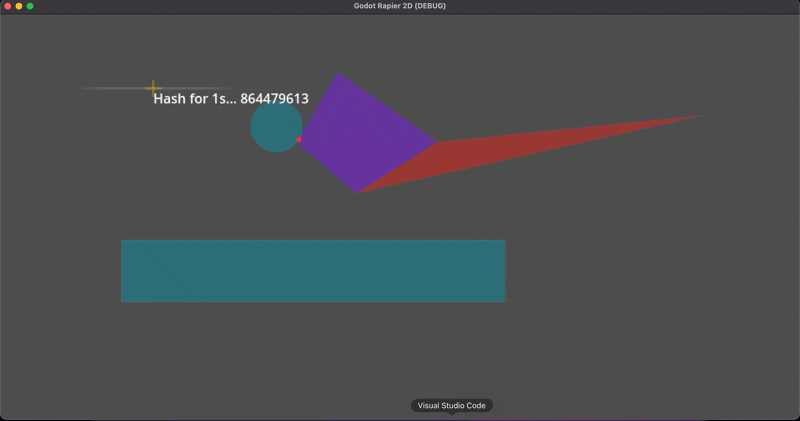Determinism
This plugin is deterministic in all variants, even the faster variant (parallel). Determinism in this context means that if the exact same initial conditions are met, the Physics State will be exactly the same.
Interesting articles about determinism:
Systems
The Systems that interact with the Godot Rapier addon are the following:
- Scene Tree: Handles nodes and their internal state.
- Godot-Rapier: The glue code written that interacts with Godot and Rapier Library.
- Rapier Library: Is both deterministic and cross platform deterministic (the latter comes with a performance penalty)
State
All of the systems have an internal state. In this case, the Godot-Rapier and Rapier Library are deterministic, but not other parts of Godot (eg. the Scene Tree).
What does this mean?
- It means that if you save the state and reload the state of the Physics Server, that will only be the state for the Physics Server. It is the job of the person writting the game to make sure other parts of the game are in sync (eg. the nodes themselves).
- It also means that, from a conceptual point, there is a physics state and a node state. A node, like a Area, has both godot state (was it intersecting last frame?) and physics state (is it intersecting now, what is the position, etc.). The difference between the two is Godot holds a node state as a cache layer in order to speed up accessing properties, while the actual source of truth is in the physics state.
A good example can be seen below. The simulation is restarted from the exact point, but the contact point remains the old one until the frame processes (the physics serve is stopped for 1 second in between):

In such a case, one can think of this as the actual simulation data, and the view of that data. It can be dangerous to rely on the view of that data, as it can be old data. The best way to get the latest data is to access directly the PhysicsServer API.
Aside for the Physics Server, another system that interacts in Godot is the Scene Tree and the Rendering System. These also have states that are not deterministic. Eg. If you load the Physics State and one callback is called later, that doesn't mean the Physics Server didn't execute deterministic, but rather that Godot internals decided to call it later (specficially the Area Collide event is called the next frame. Most things in Godot are called the next frame, so current frame after load might look wrong).
Re-running a deterministic simulation
In order to re-run a deterministic simulation, you have to have exactly the same input conditions. It's not enough to set the positions or velocities of the objects to where the objects were initially (it might look like the world inputs are the objects positions, but there are more hidden inputs too. In order to see the state of the world, use serialization functions on the space). In order to have the exact same conditions, you can reload the scene using get_tree().reload_current_scene() and then reload the Physics State using import_binary functions (for all objects and space).
Manual stepping
Rapier exposes 2 functions for manual stepping:
RapierPhysicsServer2/3D.space_step(space, delta)RapierPhysicsServer2/3D.space_flush_queries(space)
Also, if you don't want the physics space to auto step, you can use:
PhysicsServer2/3D.space_set_active(space, false)
In order to get the current space rid, use:
var space := get_viewport().world_2/3d.space
In order to get the fixed delta your project uses:
var fixed_delta = 1.0 / ProjectSettings.get_setting("physics/common/physics_ticks_per_second")
Example script:
extends Node2D
func _ready() -> void:
var space := get_viewport().world_2d.space
PhysicsServer2D.space_set_active(space, false)
func _on_button_pressed() -> void:
var space := get_viewport().world_2d.space
var fixed_delta = 1.0 / ProjectSettings.get_setting("physics/common/physics_ticks_per_second")
for i in 10:
RapierPhysicsServer2D.space_step(space, fixed_delta)
RapierPhysicsServer2D.space_flush_queries(space)
Godot
The Godot element is non deterministic. If:
- User input
- Animations
- Scripting logic
Is used to interact with the physics server, that could be a source of creating un-determinism if you don't know for sure they are deterministic.
Rapier Wrapper
The wrapper has a lot of functions. The main interface is the PhysicsServer one from godot. There are a bunch of setters and getters, a step function and most notably an iterative move_and_x function. Rapier also exposes a bunch of extra functions through the RapierPhysicsServer.